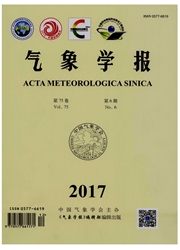

 中文摘要:
中文摘要:
在最后几十年, Qinghai 西藏高原上的内在的表面条件戏剧性地变化了,引起由于气候变化和人的活动的永久冻土降级。这个变化严重地影响了在永久冻土上面造的冷区域环境和工程基础结构。永久冻土是在空气和地面之间的相互作用的一个产品。永久冻土的形成和变化被在土之间的精力交换决定,空气 system.Fieldwork 被执行以便学习陆地表面变化怎么在永久冻土区域影响了热政体。在这篇文章,在 Fenghuo 山区域观察的地数据被用来在 Qinghai 西藏高原上在不同内在的表面下面分析热条件。结果证明那个内在的表面变化可以改变主要精力平衡和永久冻土的热条件。在永久冻土区域的热流动也被改变,导致升起的上面的土壤温度并且变厚活跃的层。植被能阻止太阳的放射进入地面,使在温暖的季节的地面凉下来。另外,植被让与地面有关的热屏蔽和热保藏功能出现并且可以使 permafiost 稳定。被黑塑料电影盖住的阴谋与自然植被盖住的阴谋相比有更高的温度。原因是黑塑料电影有低反照率,它能增加吸收太阳的放射,并且也减少土壤水分蒸发蒸腾损失总量。透明塑料电影的“温室效应”可能有效地从表面减少长波浪的放射的排放,减少从地球的表面的热损失,和显著地增加的地面出现温度。
 英文摘要:
英文摘要:
In the last several decades, the underlying surface conditions on the Qinghai-Tibet Plateau have changed dramatically, causing permafrost degradation due to climate change and human activities. This change severely influenced the cold regions environment and engineering infrastructure built above permafrost. Permafrost is a product of the interaction between the atmosphere and the ground. The formation and change of permafrost are determined by the energy exchange between earth and atmosphere system. Fieldwork was performed in order to learn how land surface change influenced the thermal regime in permafrost regions. In this article, the field data observed in the Fenghuo Mountain regions was used to analyze the thermal conditions under different underlying surfaces on the Qinghai-Tibet Plateau. Results show that underlying surface change may alter the primary energy balance and the thermal conditions of permafrost. The thermal flux in the permafrost regions is also changed, resulting in rising upper soil temperature and thickening active layer. Vegetation could prevent solar radiation from entering the ground, cooling the ground in the warm season. Also, vegetation has heat insulation and heat preservation functions related to the ground surface and may keep the permafrost stable. Plots covered with black plastic film have higher temperatures compared with plots covered by natural vegetation. The reason is that black plastic film has a low albedo, which could increase the absorbed solar radiation, and also decrease evapotranspiration. The "greenhouse effect" of transparent plastic film might effectively reduce the emission of long-wave radiation from the surface, decreasing heat loss from the earth's surface, and prominently increasing ground surface temperature.
 同期刊论文项目
同期刊论文项目
 同项目期刊论文
同项目期刊论文
 The bulk transfer coefficients in the permafrost region at the Tanggula Pass of Tibetan Plateau, Sci
The bulk transfer coefficients in the permafrost region at the Tanggula Pass of Tibetan Plateau, Sci Analysis about the influence on the thermal regime in permafrost regions with different underlying s
Analysis about the influence on the thermal regime in permafrost regions with different underlying s 期刊信息
期刊信息
